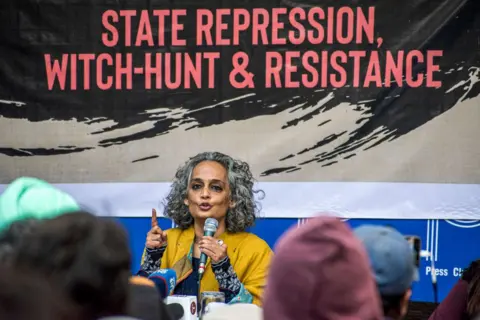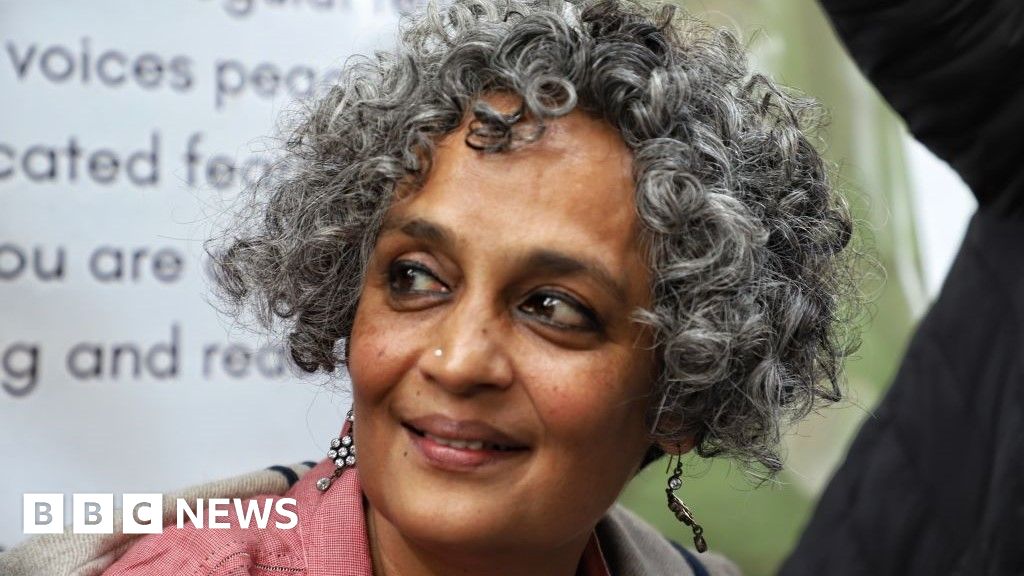Soutik BiswasIndia correspondent
 AFP via Getty Images
AFP via Getty Images“Someone once asked me what my mother’s greatest legacy to me was,” Arundhati Roy said at a private gathering in the Indian capital, Delhi, recently. “I said an overactive middle finger.”
That crack – sharp, irreverent, wickedly funny – is the perfect way into the Booker Prize-winning author and activist’s new memoir, Mother Mary Comes to Me. It is the story of Mary Roy, her formidable, mercurial mother: feminist icon, educator, crusader, eccentric, bully, inspiration. A woman who, as her daughter writes, was “my shelter and my storm”.
Arundhati Roy was an architect, actor, screenwriter and production designer before turning novelist. Her debut The God of Small Things – a childhood-inspired family saga – won the 1997 Booker. It was hailed by John Updike as a “Tiger Woodesian debut” and made her a celebrity at 36. It has since sold more than six million copies and made her wealthy. The prize gave her the “freedom to live and write on my own terms”.
Then, after a 20-year detour into essays – that split public opinion and earned her both reverence and vilification – and a second novel, Roy has returned with her first memoir.
It is not a hagiography but a raw account of a mother-daughter bond she calls “a respectful relationship between two nuclear powers. Which is OK, keep it cool”. Its leitmotif is push and pull: unsettling, bruising, often brutal, yet ultimately life-affirming.
Living with her mother was a survival act, Roy told me when we met recently. “One half of me was taking the hit and the other half of me was taking notes,” she says of her childhood. Her mother “was never a coherent, tidy character. How do you not artificially make a neat story but [of] a crumpled, broken, unresolvable character she was,” she said, trailing off. She ended up writing, she says, a “reportage of the heart”.
Mary Roy’s story is extraordinary in its own right. She walked out of her marriage with little more than a degree in education, founded a renowned school in a former Rotary Club hall in Kerala’s Kottayam district in 1967, and won a landmark Supreme Court case securing inheritance rights for Christian women.
She was also a severe asthmatic, always followed by a “frightened minion carrying her asthma inhaler, as though it were a crown, or a sceptre of some sort”. She died in 2022 at 88, a decade after stepping down from the hilltop school she had founded.
“Perhaps even more than a daughter mourning the passing of her mother, I mourn her as a writer who has lost her most enthralling subject. In these pages, my mother, my gangster, shall live,” Roy writes at the book’s opening.
 Pallikoodam
PallikoodamAyemenem – the humid, river-bound village in Kerala that became the setting for The God of Small Things – was where she grew up, homeschooled with her brother. The village was peopled with “extraordinary, eccentric, cosmopolitan people, defeated by life”, some of whom would later reappear in her fiction.
She left home at 18 for Delhi’s School of Architecture where she arrived after a three-day train ride from Cochin (now Kochi). Over the years, for long stretches, she neither saw nor spoke to her mother. “She never asked me why I left… There was no need. We both knew. We settled on a lie. A good one. I crafted it – she loved me enough to let me go.”
Her father, she writes, was little more than a ghost: a “mysterious stranger (quite handsome, we thought) in the grey photo album that Mary Roy kept locked in her cupboard and allowed us to look at occasionally”.
From a well-known Kolkata family, he drifted – alcoholic, rootless, a man described by his wife as having “this terrible business of sitting around doing nothing. Nothing. No reading, no talking, no thinking”. He ended up on the streets, in homes for the destitute, or working on tea estates in Assam.
Mary Roy turned much of her fury on her son, once beating him until a wooden ruler broke, punishment for being merely “average” while his sister excelled in school. (Lalith Kumar Christopher Roy today is a successful seafood exporter and musician.)
Watching through a keyhole, Arundhati Roy absorbed the lesson: “Since then, all personal achievement comes with a sense of foreboding. On the occasions when I am toasted or applauded, I always feel that someone else, someone quiet, is being beaten in another room.” When her mother raged at her in public, she recalls, she “swirled like water down a sink and disappeared”.
But Mother Mary Comes to Me is just not a turbulent family chronicle. It is full of eccentrics, impish humour, and the absurdities of small-town and big-city life.
Like the Kottayam dentist who fixed her teenage teeth so proudly that, “for years after that, like a cattle-owner or a horse-buyer, he thought nothing of examining my teeth in public, at social gatherings, to see how they were doing”.
 Reuters
ReutersOr her Delhi architecture school days, when she was too broke for jewellery and wore “cow beads” – fat glass beads strung across cow horns, bought off herdsmen near the hostel. The trade, she recalls, left “beaded girls in the dormitories and bare-horned cows in the meadows”.
There is the young bank employee she met on a bus trip home and who sized her up and said she was “so cute, just like a bonsai plant… before, casually as one might ask for a cigarette, asking her to marry him”.
Threading through the narrative is rock ‘n’ roll music: Joe Cocker, Jimi Hendrix, Janis Joplin, The Beatles and Jesus Christ Superstar. The Rolling Stones’ Gimme Shelter spun endlessly on an old record player while Roy worked on her architecture school thesis. She listened to She’s Leaving Home on a loop as a young woman plotting her escape. The title of the book from The Beatles song, she says, “landed on my wrist like a butterfly”.
“This is the music that put the smile on my lips and the steel in my spine,” she told me on a muggy morning in her native Kerala, rain still heavy in the air, as she spoke of writing, memory, politics and music.
Her memoir is not a conventional biography but, as she puts it, “about my relationship with my mother… about how she made me the kind of writer that I am – and then resented it”.
 LightRocket via Getty Images
LightRocket via Getty ImagesRoy describes writing as messy and physical. “I scribble and sketch, but shift quickly to the computer. I thought I’d write the whole manuscript longhand – by the third paragraph I gave up.” The memoir took her two years, but she says the act of writing is what keeps her alive: “Did you imagine how tired I would be if I wasn’t writing? That would kill me.”
Roy once spent a day in jail for contempt of court. She has also faced legal cases, accused of being “anti-national” and “anti-human”. I asked her whether, after decades of writing on big dams, Kashmir, nuclear weapons, caste and Maoist rebels – circling questions of justice – the absence of change ever feels futile, or if persistence itself becomes the point?
“I am a person who lives with defeat. It is not about me, it is about the things I have written about – those have been smashed over many times. Should we shut up because nothing is happening? No. We have to keep doing what we do,” she says.
“We need to win. But even if we don’t, we need to keep it up.”
For her book launch earlier this week, hundreds packed into the cavernous women’s college auditorium in Kochi – fittingly called the Mother Mary Hall – with an overflow crowd watching on a live stream outside. With its stage balcony, ceiling fans and rows of steel chairs with red cushions, the hall carried the vibe of an old single-screen theatre.
The launch began unusually, with Roy’s brother taking the stage for a musical send-off – opening with the Beatles’ Let It Be before sliding into Pink Floyd’s Mother.
“Mother, do you think they’ll like this song?” he sang.
It was a rousing farewell for Mary Roy, fierce and untamed in life and on the page.

